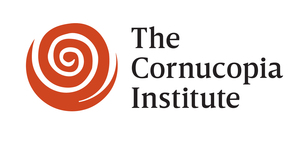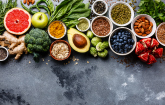CORNUCOPIA, Wis., Dec. 11, 2018 /PRNewswire/ -- A prominent organic industry watchdog, The Cornucopia Institute, has released a report on "organic" hydroponics, exposing a rapidly accelerating trend in organic fruit and vegetable production: the shift to growing produce in industrial settings, with nutrients primarily coming from a liquid fertilizer solution, instead of rich fertile soil, as required by federal law.
In addition to the report, Cornucopia published a mobile-friendly, buyer's guide, revealing the brands that clandestinely market hydroponic production as organic.
Hydroponic produce is explicitly prohibited from being labeled as organic in Canada, Mexico, and most other developed countries. The European Union recently voted to close a loophole that was permitting a few northern EU states to label hydroponics as "organic." Many countries where growers are prohibited from marketing hydroponic produce as organic, such as Holland, are major exporters to the U.S.
"With hundreds of millions of dollars' worth of venture and equity capital being invested in industrial-scale greenhouses the size of football fields, parking lots filled with thousands of containers with drip irrigation, or 'vertical farms' in cities, consumers and wholesale buyers need a way to discern which certified organic fruits and vegetables are truly nutrient-dense and produced according to the law," said Mark A. Kastel, Executive Director of The Cornucopia Institute, a Wisconsin-based farm policy research group.
No federal or state regulations require labeling or signage in grocery stores to differentiate conventional or organic hydroponic products from those grown using traditional farming practices, in soil. The largest hydroponic brands in the country, like giant berry producer Driscoll's and Wholesum Harvest, with massive greenhouses of tomatoes in the desert Southwest and Mexico, say nothing about their production practices on their cases or product labels.
"This is especially egregious in the production of organic food, as consumers are willing to pay a premium based on published research indicating true organic management practices result in nutritional superiority and flavor," noted Kastel.
Thousands of organic consumers have downloaded and signed proxy letters, addressed to the CEOs of major retailers of organic produce in this country, asking them to create in-store signage to help them choose what produce to buy. Cornucopia says that they are currently in discussions with some of the retailers, including Costco, Target, Safeway, Kroger, and Walmart.
"Consumers deserve the right to know," Kastel added.
See more: https://www.cornucopia.org/2018/12/weeding-the-organic-garden-ferreting-out-corruption/
Contact: Mark Kastel, 608-625-2042
SOURCE The Cornucopia Institute
Related Links
WANT YOUR COMPANY'S NEWS FEATURED ON PRNEWSWIRE.COM?
Newsrooms &
Influencers
Digital Media
Outlets
Journalists
Opted In





Share this article